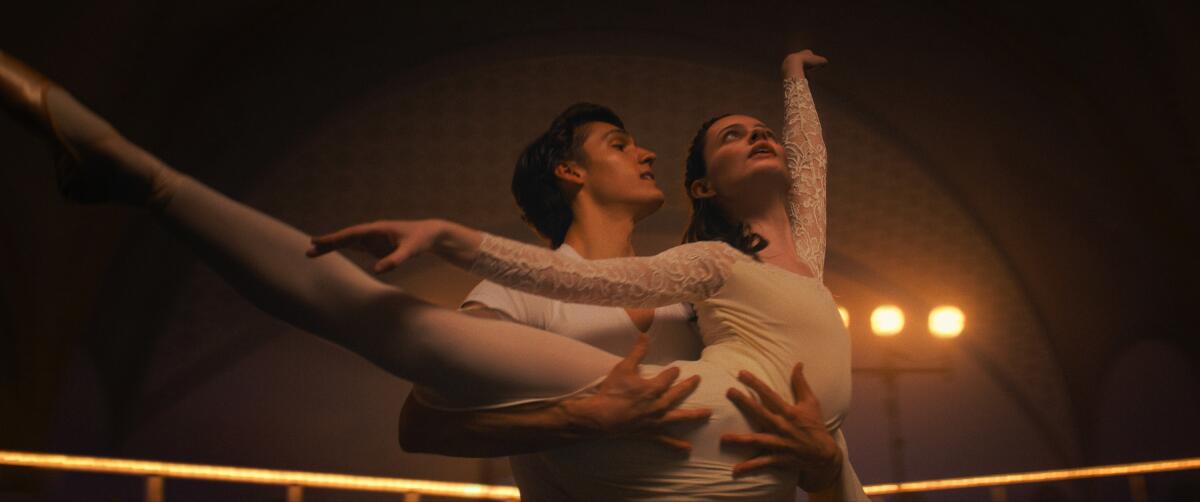Review: In the subgenre of bleak ballet, ‘Birds of Paradise’ takes a hopeful turn

- Share via
Films that portray the brutality behind the beauty of ballet have become a subgenre. From the Archers’ romantic and tragic melodrama “The Red Shoes” to Dario Argento’s gleefully witchy giallo splatterfest “Suspiria” (plus Luca Guadagnino’s 2018 remake) and Darren Aronofsky’s psychological thriller “Black Swan,” the backstage barbarism of ballet provides a fertile landscape to explore the darker parts of femininity. Yet few female filmmakers have had the chance to put their stamp on the genre, which immediately sets apart Sarah Adina Smith’s “Birds of Paradise,” a film that references and combines elements of those previous films to make a ballet movie that is dark, wicked and, indeed, beautiful.
Based on the young adult book “Bright Burning Stars” by A.K. Small, “Birds of Paradise” follows two aspiring ballerinas as they fight for the top prize at a Paris ballet school. Kate (Diana Silvers) and Marine (Kristine Froseth) are both Americans in Paris, but they couldn’t be more different. Kate, hailing from Virginia, is a scholarship student and an inelegant outsider, while Marine, the daughter of the American ambassador, has been training for this honor her entire life. Her dance partner and twin, Ollie, recently died by suicide, and a desire to “win for Ollie” drives her to succeed by any means necessary.
The world that Smith spins, in collaboration with longtime cinematographer Shaheen Seth, choreographer Celia Rowson-Hall and composer Ellen Reid, is a modernist fantasy of the imagined ideal of a cutthroat French ballet school where drugs flow easily and the line between dance and sex is frequently blurred. It portrays ballet as a competitive, catty, bloody and superstitious art form, though it’s been heightened and twisted into a soapy teen melodrama of secrets, scheming and sabotage.
Though Kate and Marine start out as brawling ballerinas, they quickly become inextricably intertwined besties. Marine, mourning Ollie’s loss, needs a twin, and she quickly replaces her brother with Kate. They take an oath to win the prize together, but it becomes apparent that both cannot occupy the same top spot: While Kate becomes subsumed into the strict system enforced by their teacher Madame Brunelle (Jacqueline Bisset), Marine has no choice but to break with it entirely.
This tale is familiar and a bit formulaic, though singed with scandal, but the appeal of “Birds of Paradise” is its ultra-cool style. Reid’s abstract electronic score soundtracks Rowson-Hall’s choreography, which disrupts traditional ballet techniques with modern dance flair. The stark white-on-white studio where the balletic battles are set is juxtaposed against an underground club called Jungle, a wild, hedonistic and hallucinatory world of modern dance. Seth’s cinematography is stunning, meeting the mood of each contrasting moment but set within a cohesive look that gives the film a dreamy, unreal quality.
Despite the drugs, glamour, death and twincest, there’s something about the seemingly sordid “Birds of Paradise” that feels sanded down and sanitized. It’s titillation for a young adult audience, the emotional beats easy to digest. It’s not as troubling as “Black Swan” or as operatically violent as “Suspiria” or even as desperately tragic as “The Red Shoes,” though it gestures at those themes. Ultimately, “Birds of Paradise” is hopeful, which seems almost out of character with the kind of film it’s trying to be. Breaking with cinematic tradition, it imparts a message of redemption, of falling with the chance to rise again.
Katie Walsh is a Tribune News Service film critic.
‘Birds of Paradise’
Rated: R, for drug use, sexual content, language and brief nudity
Running time: 1 hour 53 minutes
Playing: Available Sept. 24 on Amazon Prime
More to Read
Only good movies
Get the Indie Focus newsletter, Mark Olsen's weekly guide to the world of cinema.
You may occasionally receive promotional content from the Los Angeles Times.










